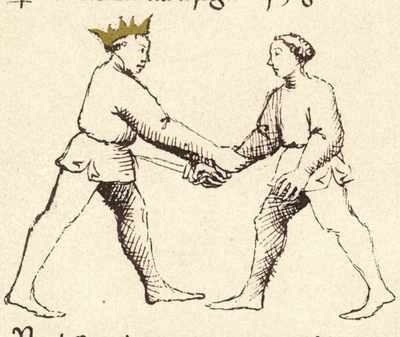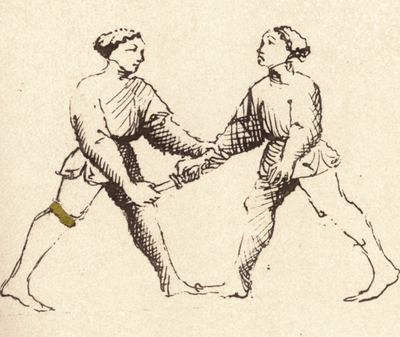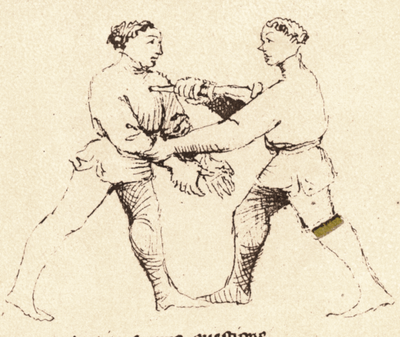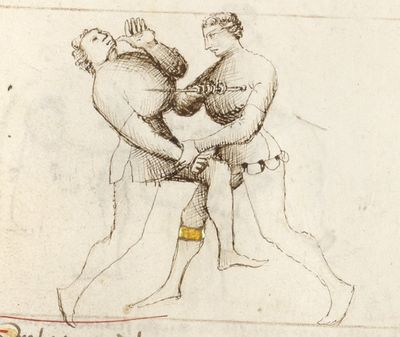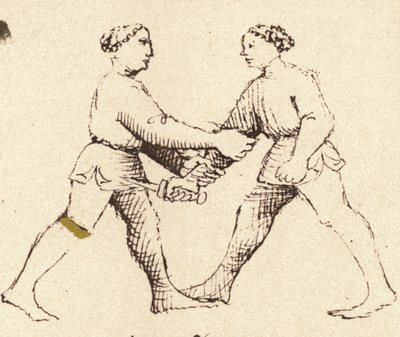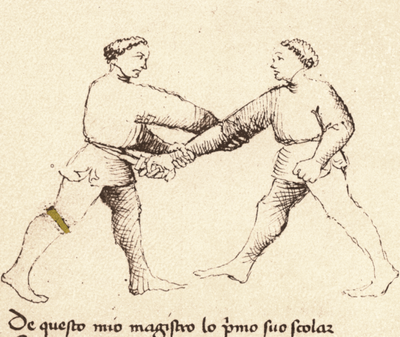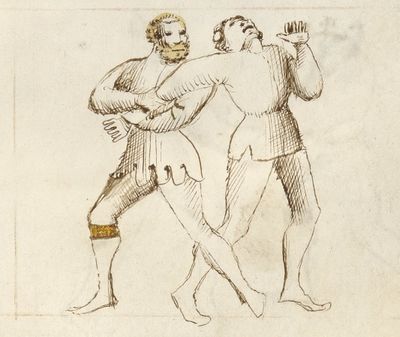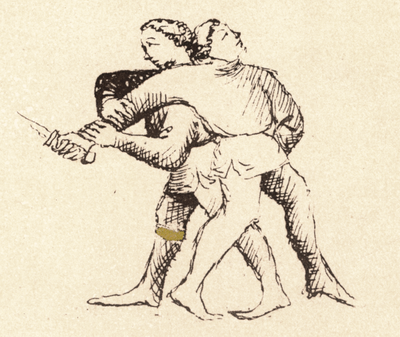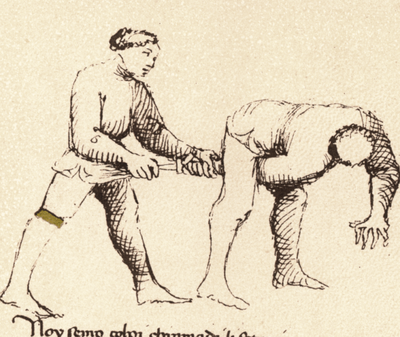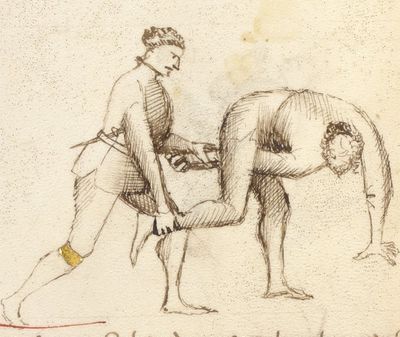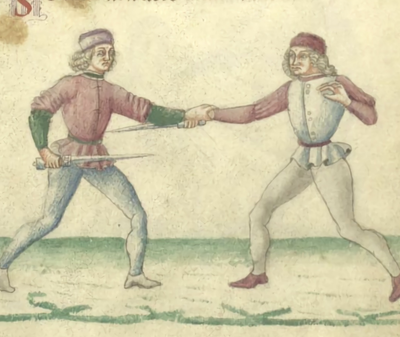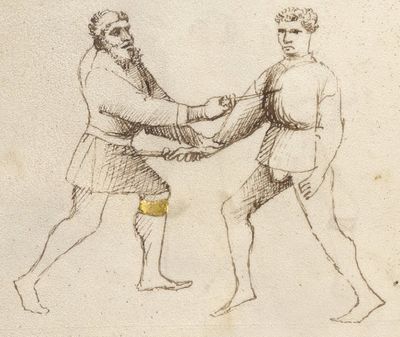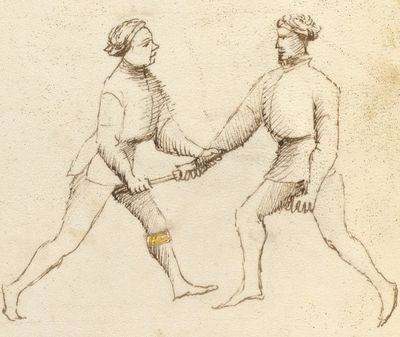|
|
You are not currently logged in. Are you accessing the unsecure (http) portal? Click here to switch to the secure portal. |
Difference between revisions of "Fiore de'i Liberi/Dagger/9th master"
m (Text replacement - "Fior di Battaglia (MS M.383)" to "Trattato della scherma (MS M.383)") |
|||
| (5 intermediate revisions by the same user not shown) | |||
| Line 1: | Line 1: | ||
<noinclude><div style="width:240em;"></noinclude> | <noinclude><div style="width:240em;"></noinclude> | ||
| − | {| class=" | + | {| class="master" |
|- | |- | ||
| − | ! <p><includeonly><span style="font-weight:normal; font-size:85%;">[{{edit|Fiore de'i Liberi/Dagger/9th master|edit}}]</span> </includeonly> | + | ! <p><includeonly><span style="font-weight:normal; font-size:85%;">[{{edit|Fiore de'i Liberi/Dagger/9th master|edit}}]</span> </includeonly>Illustrations</p> |
| − | ! <p> | + | ! <p>Illustrations</p> |
| − | ! <p>{{rating|B| | + | ! <p>''{{rating|B|Novati Translation}} by [[Michael Chidester]]''<br/>{{rating|B|Getty Translation}} by [[Colin Hatcher]]</p> |
| − | ! <p>{{rating|C| | + | ! <p>''{{rating|C|Paris Translation}} by [[Kendra Brown]] and [[Rebecca Garber]]''<br/>{{rating|B|Morgan Translation}} by [[Michael Chidester]]</p> |
| − | ! <p>[[ | + | ! <p>[[Trattato della scherma (MS M.383)|Morgan Transcription]] (1400s){{edit index|Trattato della scherma (MS M.383)}}<br/>by [[Michael Chidester]]</p> |
| − | ! <p>[[Fior di Battaglia (MS Ludwig XV 13)|Getty Transcription]]{{edit index|Fior di Battaglia (MS Ludwig XV 13)}}<br/> | + | ! <p>[[Fior di Battaglia (MS Ludwig XV 13)|Getty Transcription]] (1400s){{edit index|Fior di Battaglia (MS Ludwig XV 13)}}<br/>by [[Michael Chidester]]</p> |
| − | ! <p>[[Flos Duellatorum (Pisani Dossi MS)|Pisani Dossi Transcription]]{{edit index|Flos Duellatorum (Pisani Dossi MS)}}<br/>by [[Francesco Novati]]</p> | + | ! <p>[[Flos Duellatorum (Pisani Dossi MS)|Pisani Dossi Transcription]] (1409){{edit index|Flos Duellatorum (Pisani Dossi MS)}}<br/>by [[Francesco Novati]]</p> |
| − | ! <p>[[Florius de Arte Luctandi (MS Latin 11269)|Paris Transcription]]{{edit index|Florius de Arte Luctandi (MS Latin 11269)}}<br/>by [[Kendra Brown]] and [[Rebecca Garber]]</p> | + | ! <p>[[Florius de Arte Luctandi (MS Latin 11269)|Paris Transcription]] (1420s){{edit index|Florius de Arte Luctandi (MS Latin 11269)}}<br/>by [[Kendra Brown]] and [[Rebecca Garber]]</p> |
|- | |- | ||
| Line 150: | Line 150: | ||
|- | |- | ||
| − | | | + | | class="noline" | |
| − | | style="text-align:center; vertical-align:middle;" | [No Image] | + | | class="noline" style="text-align:center; vertical-align:middle;" | [No Image] |
| − | | <p>[110] The Counter-remedy to this Ninth [Dagger Remedy] Master's play is as follows: when the ''Zugadore'' with his left hand has seized your right hand that has the dagger, then you should quickly seize your dagger near the point and strongly draw or pull it back towards you so that he has to let go of it, or alternately press the dagger point into his elbow to make him think twice.</p> | + | | class="noline" | <p>[110] The Counter-remedy to this Ninth [Dagger Remedy] Master's play is as follows: when the ''Zugadore'' with his left hand has seized your right hand that has the dagger, then you should quickly seize your dagger near the point and strongly draw or pull it back towards you so that he has to let go of it, or alternately press the dagger point into his elbow to make him think twice.</p> |
| − | | | + | | class="noline" | |
| − | | | + | | class="noline" | |
| − | | {{section|Page:MS Ludwig XV 13 18v.jpg|18v-f}} | + | | class="noline" | {{section|Page:MS Ludwig XV 13 18v.jpg|18v-f}} |
| − | | | + | | class="noline" | |
| − | | | + | | class="noline" | |
|}<noinclude></div> | |}<noinclude></div> | ||
{{reflist}}</noinclude> | {{reflist}}</noinclude> | ||
Latest revision as of 03:08, 12 May 2021
Illustrations |
Illustrations |
Novati Translation |
Paris Translation |
Morgan Transcription (1400s) |
Getty Transcription (1400s) |
Pisani Dossi Transcription (1409) |
Paris Transcription (1420s) |
|---|---|---|---|---|---|---|---|
[100] From this grip that I have I can do many plays. I am the Ninth King [and Dagger Remedy Master] and I no longer have a dagger. And this grip that I make from the low attack is similar to the grip made by the Fourth King [and Dagger Remedy Master], only this one is made against the low attack instead of the high attack, and my plays are not the same as his. This grip is good whether in armor or unarmored, and from it you can make many good strong plays, as shown below. Whether in armor or unarmored there is no doubt of their effectiveness. |
[17v-c] ¶ Lo nono Re son, e piu non e di daga, e tal presa che io fazo de sotto, tale presa fa lo Quarto Re di sapramane ch'io faço di sotta. Ma gli miei zogi non si fano cum gli soi nigotta. Questa presa vale in arme e senza che io posso fare zogi assai e forti. E maxima mente quelli che mi fano seguito. In arme e senza di loro non è dubito. |
[12a-d] Per questa presa'che'i'o asaii zoghi posso far |
|||||
[101] If I rotate the dagger close to your elbow, I have followed on from the presa of the Ninth [Dagger Remedy] Master. Taking my right hand from the grip, I seize your dagger as shown and I rotate it upwards close to your elbow. And I will then thrust the point into your face for certain, or I will deal with you as the next student will demonstrate. |
[17v-d] ¶ Lo mio Magistro Nono cum la presa ch'ello ha fatta quella ho seguita Lassando la mia mano dritta dela presa, Piglai la tua daga commo io fazo per apresso lo tuo cubito gli daro volta in erto. La punta ti metero in lo volto per certo. Segondo che lo scolar fa chi m'e dredo. In quello modo ti faro come i'credo. |
[12a-e] Si io volto la daga per apresso tuo cubito |
|||||
[102] The first student of this Master I complete the play of the student who came before me, and from his grip this is how he should finish his play. Other students will make different plays from his grip. Watch those who follow, and you will see their techniques. |
The student will perhaps be able to make this play of that master [of yours], [In the Paris, the Scholar wears a Master's crown.] |
[18r-a] ¶ Questo zogo che fa lo scolar che m'e denanzi, io fazzo suo complimento, per che dela sua presa qui si finisse lo zogo suo. Ben che gl'altri soii scolari farano de tal presa altri zogi. Guardate dredo e vederete gli loro modi. |
[12b-c] De questo mio magistro lo primo suo scolar |
||||
[103] I can dislocate your arm like this, My Master's grip has already been demonstrated. Here my right hand leaves his grip. And if I grip you under your elbow, I can dislocate your arm. And also from this grip I can put you into a bind, namely the “strong key” [lower bind], which is one the third King and [Dagger Remedy] Master showed in his plays In his sixth play [38] he shows you how this one is done. [In the Getty, the Scholar's right foot is forward.] |
I can truly dislocate your shoulder in this same way; [In the Paris, the Scholar wears a crown.] |
[18r-b] ¶ La presa del mio Magistro quella o fatta vista. E la mia man dritta lassai dela sua presa. E si t'o preso sotto lo tuo dritto cubito, Per dislogarte lo brazzo. E anchora cum tal presa ti posso metter in ligadura zoe in chiave forte. Che lo terço Re e magistro reze soi zogi. In lo Sesto zogho sono gli soi modi. |
[38r-c] ¶ Denodare modo simili tibi nempe lacertum | ||||
[104] If I can give your arm a half turn, I have arrived at this position from the grip of my Master [Ninth Dagger Remedy Master], and I do not remain in this grip but move into the lower bind, also known as the “strong key.” This I can do without difficulty, and I can then easily take your dagger. [In the Getty, the Scholar's right foot is forward.] |
I prepare to take away your life using the [In the Paris, the Scholar wears a crown.] |
[18r-c] ¶ Per la presa del mio magistro io son venudo in questa. E di questa presa non faro resta che te mettero in ligadura sottana çoe in chiave forte. Che a mi e pocha di briga. Ben che la tua daga ben possa avere senza fadiga. |
[12b-a] Si a tuo braço posso dare meça volta |
[38r-a] ¶ Inferiore tibi nexura tollere vitam | |||
[105] Without releasing my grip I enter underneath your arm, I have not abandoned the grip of my Master [the Ninth Dagger Remedy Master], but I have quickly entered under his right arm, to dislocate it with this grip. I can do this whether he is wearing armor or not, and once I have him held from behind and in my power, I will show him no mercy as I hurt him. |
Behold! I crossed beneath the shoulder during play, |
[18r-d] ¶ La presa del mio magistro non o abandonada. Anche subito intrai per sotto lo suo brazzo dritto per dislogargli quello cum tal presa. O armado o desarmado questo gli faria. E quando io lo tegniro dredo de lu'in mia bailia per mal fare no gli rendero cortesia. |
[12a-f] Non lassando la presa pasaii per soto tuo braço |
[37v-c] ¶ En ego transivj subter ludendo lacertum. | |||
[106] Although this play is not often employed, I did not abandon the grip of my Master [the Ninth Dagger Remedy Master] and the Zugadore saw that he could not break my grip on his arm. And as he pressed downwards towards the ground with his dagger, I quickly reached through his legs from behind and grabbed his right hand with my left hand. And once I had a good grip on his hand, I passed behind him. And as you can see in the picture, he cannot dismount his own arm without falling. And I can now also do the play that follows me. If I let go of the dagger with my right hand, and I grab his foot I will send him crashing to the ground, and I cannot fail to take his dagger. |
It is granted that this play could scarcely be learned by this art, |
[18v-a] ¶ La presa del mie magistro non abandonai in fin che questo zugador vidi vidi[3] che non lassava la presa. E luii se inchina cum la daga in verso terra E io subito piglai la sua mano cum la mia mancha per enfra le soi gambe. E quando la sua mano hebbe ben afferada, dredo de lu passai. Comomo possete vedere ch'ello non si po discavalcare sença cadere. E questo zogho che m'e dredo posso fare. La man dritta dela daga lassa, e per lo pe lo vegno a piglare, per farlo in terra del tutto andare, e a torgli la daga no mi po manchare. |
[12b-d] Ben che aquesto zogho non sia tropo usado |
[43r-a] ¶ Iste licet ludus vix sit hac cognitus arte, | |||
[107] The student who preceded me performed the first part of this play, and I make the finish by driving him into the ground, as has already been explained. Although this play is not commonly performed in the art, I wish to show you that I have a complete knowledge of it. |
[18v-b] ¶ Questo scolaro che m'e denanzi, a fatto lo principio. & io fazo del so zogho la fine, de mandarlo in terra como ello ha ben ditto. Per che questo zogho non habia corso in l'arte, volemo mostrare che in tutta liei habiamo parte. |
||||||
[108] I made the cover of my Master [the Ninth Dagger Remedy Master] and then quickly I gripped him in this way with my left hand. And then I drew my dagger and thrust it into his chest. And if I do not have time to draw my dagger, I will make the play that follows me. |
[18v-c] ¶ Del mio magistro fese sua coverta e subito cum mia mano stancha, presi la sua a questo modo. E cum la mia dagha gli fazo una punta in lo suo petto. E si la daga mia no fosse sufficiente, Faria questo zogo che a mi e seguente. |
||||||
[109] With this play I complete the play of the student who preceded me, who left his [sheathed] dagger where it was and instead decided to take your live dagger. I have already explained how this play is performed. |
[18v-d] ¶ Questo zogo complisco de questo scolaro che m'e denanzi che lassa la sua daga cativa e vole la tua bona. Questo che io ti fazo, a luii tu la rasona. |
||||||
| [No Image] | [110] The Counter-remedy to this Ninth [Dagger Remedy] Master's play is as follows: when the Zugadore with his left hand has seized your right hand that has the dagger, then you should quickly seize your dagger near the point and strongly draw or pull it back towards you so that he has to let go of it, or alternately press the dagger point into his elbow to make him think twice. |
[18v-f] ¶ Lo contrario dello Nono Magistro si'e questo, che quando lo zugadore a presa la man dritta cum la daga cum la sua man stancha, che subito lo zugadore, pigli la sua daga a presso la punta e tragala overo tiri in verso di si si forte che'la convegna lassare, overo gli daga penta al chubito per farlo svariare. |
- ↑ This is read as a corrected error, in which the scribe began to write aufa, crossed out the 'a', continued the 're' and used the 'er' abbreviation above the incorrect letter.
- ↑ There's a marginal note that's hard to interpret: "n p o" or perhaps "R P O".
- ↑ "vidi" appears twice, but neither is struck out.

